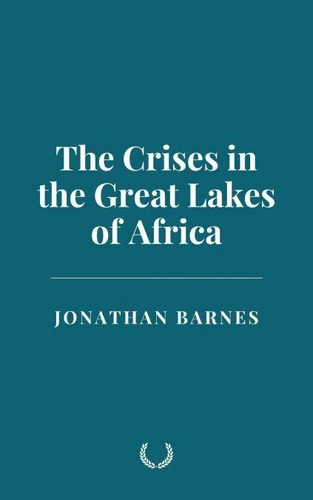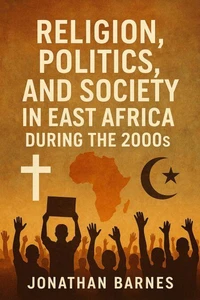The Crises in the Great Lakes of Africa
Par :Formats :
Disponible dans votre compte client Decitre ou Furet du Nord dès validation de votre commande. Le format ePub est :
- Compatible avec une lecture sur My Vivlio (smartphone, tablette, ordinateur)
- Compatible avec une lecture sur liseuses Vivlio
- Pour les liseuses autres que Vivlio, vous devez utiliser le logiciel Adobe Digital Edition. Non compatible avec la lecture sur les liseuses Kindle, Remarkable et Sony
 , qui est-ce ?
, qui est-ce ?Notre partenaire de plateforme de lecture numérique où vous retrouverez l'ensemble de vos ebooks gratuitement
Pour en savoir plus sur nos ebooks, consultez notre aide en ligne ici
- FormatePub
- ISBN8230258223
- EAN9798230258223
- Date de parution20/01/2025
- Protection num.pas de protection
- Infos supplémentairesepub
- ÉditeurIndependently Published
Résumé
This book provides a comprehensive examination of the complex and often tragic history of the Great Lakes region of Africa, focusing on the underlying causes and consequences of conflict, the challenges to governance, and the struggles for peace, justice, and development. Spanning multiple countries, including Rwanda, Burundi, Uganda, and the Democratic Republic of the Congo, the narrative traces the region's colonial history, the emergence of ethnic and political tensions, and the devastating wars that have shaped the lives of millions.
The book analyzes the role of both local and international actors in fueling and attempting to resolve these conflicts, with a particular emphasis on the interplay between external interventions, resource exploitation, and regional politics. Through deep historical analysis and the exploration of key concepts such as ethnic identity, the effects of colonialism, and the complexities of transitional justice, the book critically examines the legacies of violence and the long road to reconciliation.
It highlights both the failures and successes of post-conflict peacebuilding efforts, including the role of grassroots movements, media, and international aid. The book also investigates the ongoing political and economic challenges in the region, offering a nuanced perspective on the prospects for stability, sustainable development, and democratic governance in the face of entrenched power dynamics, corruption, and a history of conflict.
Ultimately, it offers a reflection on the region's enduring struggles and the potential pathways to a more peaceful and prosperous future, built on justice, reconciliation, and regional cooperation.
The book analyzes the role of both local and international actors in fueling and attempting to resolve these conflicts, with a particular emphasis on the interplay between external interventions, resource exploitation, and regional politics. Through deep historical analysis and the exploration of key concepts such as ethnic identity, the effects of colonialism, and the complexities of transitional justice, the book critically examines the legacies of violence and the long road to reconciliation.
It highlights both the failures and successes of post-conflict peacebuilding efforts, including the role of grassroots movements, media, and international aid. The book also investigates the ongoing political and economic challenges in the region, offering a nuanced perspective on the prospects for stability, sustainable development, and democratic governance in the face of entrenched power dynamics, corruption, and a history of conflict.
Ultimately, it offers a reflection on the region's enduring struggles and the potential pathways to a more peaceful and prosperous future, built on justice, reconciliation, and regional cooperation.
This book provides a comprehensive examination of the complex and often tragic history of the Great Lakes region of Africa, focusing on the underlying causes and consequences of conflict, the challenges to governance, and the struggles for peace, justice, and development. Spanning multiple countries, including Rwanda, Burundi, Uganda, and the Democratic Republic of the Congo, the narrative traces the region's colonial history, the emergence of ethnic and political tensions, and the devastating wars that have shaped the lives of millions.
The book analyzes the role of both local and international actors in fueling and attempting to resolve these conflicts, with a particular emphasis on the interplay between external interventions, resource exploitation, and regional politics. Through deep historical analysis and the exploration of key concepts such as ethnic identity, the effects of colonialism, and the complexities of transitional justice, the book critically examines the legacies of violence and the long road to reconciliation.
It highlights both the failures and successes of post-conflict peacebuilding efforts, including the role of grassroots movements, media, and international aid. The book also investigates the ongoing political and economic challenges in the region, offering a nuanced perspective on the prospects for stability, sustainable development, and democratic governance in the face of entrenched power dynamics, corruption, and a history of conflict.
Ultimately, it offers a reflection on the region's enduring struggles and the potential pathways to a more peaceful and prosperous future, built on justice, reconciliation, and regional cooperation.
The book analyzes the role of both local and international actors in fueling and attempting to resolve these conflicts, with a particular emphasis on the interplay between external interventions, resource exploitation, and regional politics. Through deep historical analysis and the exploration of key concepts such as ethnic identity, the effects of colonialism, and the complexities of transitional justice, the book critically examines the legacies of violence and the long road to reconciliation.
It highlights both the failures and successes of post-conflict peacebuilding efforts, including the role of grassroots movements, media, and international aid. The book also investigates the ongoing political and economic challenges in the region, offering a nuanced perspective on the prospects for stability, sustainable development, and democratic governance in the face of entrenched power dynamics, corruption, and a history of conflict.
Ultimately, it offers a reflection on the region's enduring struggles and the potential pathways to a more peaceful and prosperous future, built on justice, reconciliation, and regional cooperation.

















